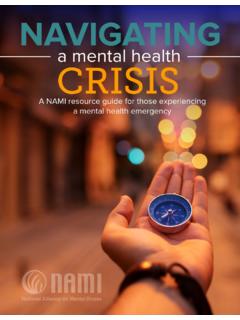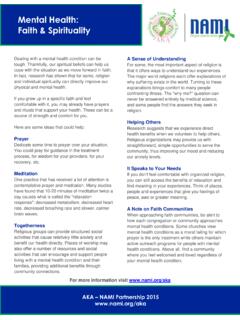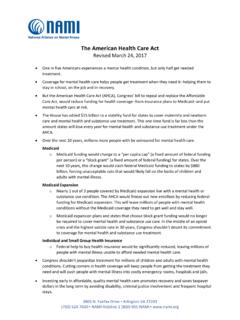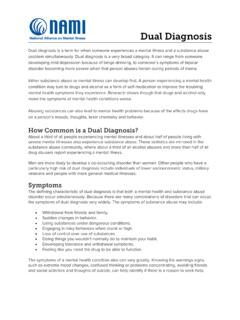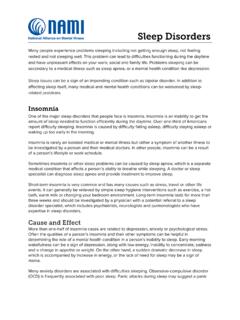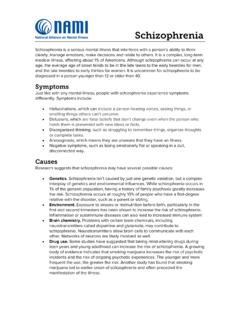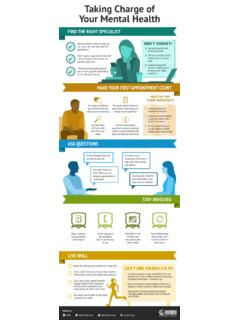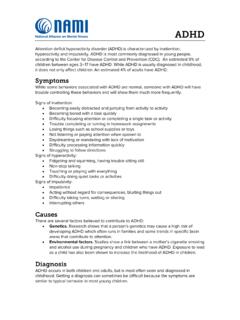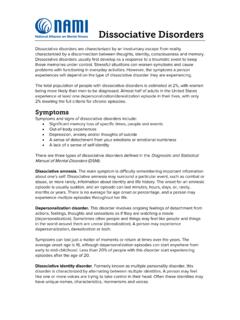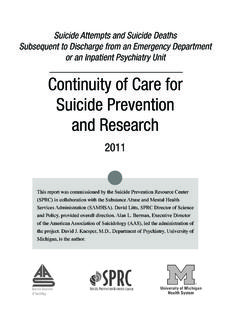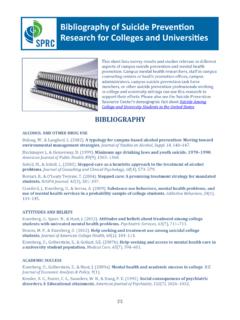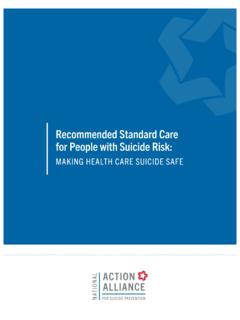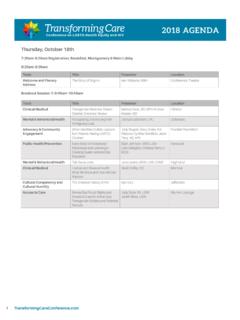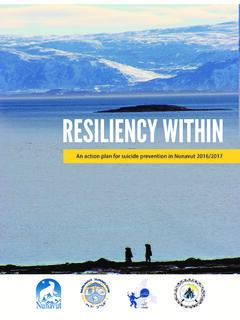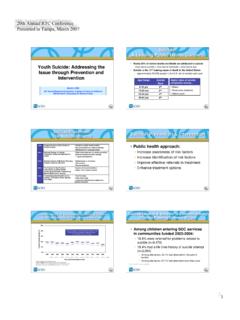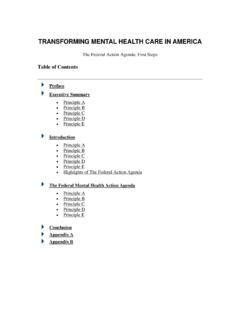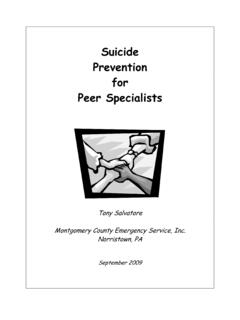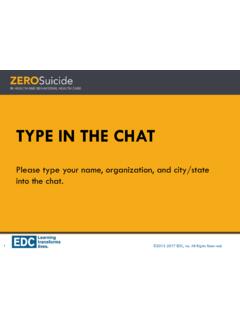Transcription of Veterans Health Administration (VHA): Mental Health ...
1 Veterans Health Administration (VHA): Mental Health services Overview June 2016 V E T E R A N S H E A LT H A D M I N I S T R AT I O N Uniform Mental Health services Integration into Primary Care Inpatient Care Residential Care General Outpatient Care Specialty Outpatient Care 24 hours, 7 days a week Care Gender-sensitive Care Care Transitions Evidence-based psychotherapies suicide prevention Coordinators Telemental Health Evidence-based Treatments Rehabilitation and Recovery services Therapeutic and Supported Employment services Disaster Preparedness Collaboration with Homeless Programs and services for Justice Involved Veterans VHA is committed to provide a uniform package of Mental Health services that is Veteran-centered, recovery-oriented, and evidence-based and that supports personalized, proactive, patient-centered care, including: 1 V E T E R A N S H E A LT H A D M I N I S T R AT I O N Overview of VA Mental Health services Over the last several years, the Department of Veterans Affairs (VA) has been transforming toward an integrated Mental Health delivery system both during the transition from Servicemember to Veterans status, and by broadening VA s continuum of care.
2 VA has many entry points for care including 151 medical centers, 820 community based outpatient clinics, 300 Vet centers, the Veterans Crisis Line, VA staff on university campuses and other outreach efforts. VA has expanded clinical programs to provide proactive screening for depression, posttraumatic stress disorder (PTSD), problem use of alcohol, military sexual trauma and delivery of Mental Health treatment in primary care and other medical and rehabilitation settings. VA provides evidence-based specialty Mental Health care in inpatient, residential and outpatient settings with subspecialty care for PTSD, substance abuse and serious Mental illness, as well as general Mental Health and vocational services . 2 V E T E R A N S H E A LT H A D M I N I S T R AT I O N VA Mental Health Service Delivery Medical Centers & Community-Based Outpatient Clinics (CBOC) Direct VA staffing Telemental Health between facilities, into CBOCs, and into Veterans homes Non-VA care (fee basis and contract care) Veterans Crisis Line and other call centers Web resources and mobile apps MH providers on college campuses 3 V E T E R A N S H E A LT H A D M I N I S T R AT I O N Readjustment Counseling services Vet Centers Provide readjustment counseling Located in community settings Mobile Vet Centers to take care to rural areas 4 V E T E R A N S H E A LT H A D M I N I S T R AT I O N Mental Health services in VA.
3 Integration with Physical Health Primary care/ Mental Health integration Co-located, collaborative care within Patient Aligned Care Teams Care management and support Provides access and promotes engagement and adherence Improved outcomes Home Based Primary Care Women s Health Clinics Long-term care and end-of-life care Hospice and Palliative Care Community Living Centers Physical Rehabilitation Polytrauma units Spinal Cord Injury units Blindness Rehabilitation Centers Interdisciplinary medical specialty clinics, such as: Pain clinics, Oncology, Endocrinology 5 V E T E R A N S H E A LT H A D M I N I S T R AT I O N Mental Health services in VA: General Mental Health Clinics Implementation of at least one Behavioral Health Interdisciplinary Program (BHIP) team at every Medical Center Interdisciplinary teams will provide the majority of Mental Health care necessary for a panel of assigned Veterans and thus open access to Mental Health care for all eligible Veterans .
4 Teams leverage the expertise of individual members to provide recovery-oriented, evidence-based treatments for all Mental Health issues presented by Veterans . BHIP principles include: Patient centered prevention / population Health Team based Providing value Data driven Continuous improvement 6 V E T E R A N S H E A LT H A D M I N I S T R AT I O N Mental Health services in VA: Outpatient Sub-Specialty Care services PTSD care teams: Substance Use Disorder (SUD) specialist on, or accessible to, every team. Mental Health Intensive Care Management (MHICM): Interdisciplinary teams who provide community-based Mental Health care for Veterans with serious Mental illness who have intensive needs. RANGE/ E-RANGE: Teams that extend MHICM services to rural areas. Psychosocial Rehabilitation and Recovery Centers: Outpatient transitional learning centers with curriculum-based programming designed to support recovery and integration into meaningful self-determined community roles for Veterans with serious Mental illness and severe functional impairment.
5 Substance Use Disorder (SUD) care: Mental Health professionals and peer supports Detox (often in medical units) Outpatient clinics for SUD Intensive Outpatient services for SUD Evidence-based psychopharmacology treatments 7 V E T E R A N S H E A LT H A D M I N I S T R AT I O N Mental Health services in VA: Acute Inpatient and Residential services Inpatient Mental Health care Available to Veterans who are at risk to themself or others Interdisciplinary team care (including medical care) Recovery oriented and patient-centered services Required follow-up after discharge to outpatient services Residential Rehabilitation Treatment Programs Population with extensive comorbid diagnoses across Mental Health problems, SUD problems, homelessness, etc. Interdisciplinary staffing and services to address a wide range of comorbid disorders 8 V E T E R A N S H E A LT H A D M I N I S T R AT I O N Integration across Specialty Mental Health Settings Psychosocial Rehabilitation model with a Recovery orientation Local Recovery Coordinators empowered to work across settings to ensure continuity of care within a Recovery framework Mental Health Treatment Coordinator for every Veteran receiving Mental Health care (usually one of their providers) Requirement for outpatient follow-up after inpatient and residential Mental Health stays Provision of specialty Mental Health services via telemental Health when appropriate 9 V E T E R A N S H E A LT H A D M I N I S T R AT I O N Public Health Model of Veteran Mental Health Care VA has traditionally served only those enrolled for care.
6 Many Veterans choose to obtain Mental Health care outside VA, or in a combination of VA and non-VA sites. VA recognizes the crucial role of community partners in caring for Veterans and their families. Priorities include: Educating community providers on military and Veteran issues Partnering to ensure care for family members for services VA cannot provide Partnering in outreach and anti-stigma efforts 10 V E T E R A N S H E A LT H A D M I N I S T R AT I O N Mental Health services in VA: suicide prevention suicide prevention requires ready access to high quality Mental Health (and other Health care) services . services are supplemented by programs designed to: help individuals & families engage in care address suicide prevention in high risk patients 9 V E T E R A N S H E A LT H A D M I N I S T R AT I O N suicide prevention Initiatives Hubs of expertise Center of Excellence Mental Illness research , Education, and Clinical Center National programs for education and awareness Operation (Know the Signs, Ask the question, Validate the feelings, Expedite help) suicide Risk Management Training for Clinicians Traumatic Brian Injury (TBI) and suicide Women Veterans and suicide Older Veterans and suicide Primary Care Provider Veterans Crisis Line 1-800-273-TALK (8255) Press 1 for Veterans Veterans Chat Veterans Text.
7 838255 suicide prevention Coordinators Federal partnerships 10 V E T E R A N S H E A LT H A D M I N I S T R AT I O N Veterans Crisis Line 13 11 V E T E R A N S H E A LT H A D M I N I S T R AT I O N Enhanced Care Package for Patients at High Risk for suicide High Risk Patients Chart notification system flag Safety Plan Treatment Plan modifications Means restriction Family / friend involvement Follow-up for missed appointments 12 V E T E R A N S H E A LT H A D M I N I S T R AT I O N Posttraumatic Stress Disorder (PTSD) In FY 2015, over 568,000 Veterans (over 178,000 Operation Enduring Freedom/Operation Iraqi Freedom/Operation New Dawn (OEF/OIF/OND)) received treatment for PTSD in VAMCs and clinics, up from over 500,00 Veterans (over 100,000 OEF/OIF/OND) in FY 2011. State-of-the-art treatments are available for Veterans with PTSD: More than 5,200 VA Mental Health staff have received training in Prolonged Exposure and/or Cognitive Processing Therapy, the most effective known therapies for PTSD.
8 Medication treatments also are offered and may be especially helpful for specific symptoms of PTSD. VA operates a National Center for PTSD (NCPTSD), which guides a national PTSD Mentoring program, which works with every specialty PTSD program across the country to improve care. The NCPTSD s award winning PTSD Web site contains research based educational materials for Veterans and families, as well as for providers. The NCPTSD offers a Consultation Program available to any VA provider who treats Veterans with PTSD, helping with questions about assessment and treatment services . 15 V E T E R A N S H E A LT H A D M I N I S T R AT I O N National Campaigns and Community Facing Programs 16 V E T E R A N S H E A LT H A D M I N I S T R AT I O N Campaign Messaging for the Veterans Crisis Line 17 22 V E T E R A N S H E A LT H A D M I N I S T R AT I O N National Outreach Campaign: Make the Connection is VA s public awareness and outreach campaign that connects Veterans and their friends and family members with information, resources, and solutions related to issues affecting their Health , well-being, and relationships.
9 Goal to reduce the stigma many Veterans and their families associate with seeking Mental Health support 18 More than 200 Veterans and their family members have contributed personal, candid testimonials about seeking treatment for challenges ranging from TBI and PTSD to depression to flashbacks Highlights the particular strengths of Veterans that have sought support and are living a richer life today as a result: resilience, courage, perseverance, leadership, mission-focus V E T E R A N S H E A LT H A D M I N I S T R AT I O N Released end of September, 2012 Designed to assist all community Mental Health providers understand and provide Veteran specific Mental Health care Will grow and develop throughout the rest of the calendar year 19 Community Provider Toolkit V E T E R A N S H E A LT H A D M I N I S T R AT I O N Start Moving Forward 20 V E T E R A N S H E A LT H A D M I N I S T R AT I O N AboutFace National Center for PTSD award-winning educational campaign online video gallery of Veterans telling their stories of how PTSD treatment has turned their lives around Goal.
10 To help Veterans recognize their PTSD and encourage them to seek treatment Currently contains Veteran, Clinician, & Family Interviews Longer PTSD Profiles Coming Soon PTSD Previews Veteran journey through PE Veteran journey through CPT 21 V E T E R A N S H E A LT H A D M I N I S T R AT I O N Mobile Applications 22 V E T E R A N S H E A LT H A D M I N I S T R AT I O N Mobile Apps for Mental Health : PTSD Coach In April 2011, the first in a suite of VA/Department of Defense (DoD) mobile apps was launched the PTSD Coach. PTSD Coach helps users track their PTSD symptoms, links them with public and personalized sources of support, provides accurate information about PTSD, and teaches helpful strategies for managing PTSD symptoms. The app can be downloaded free from iTunes and the Droid Marketplace and is available in multiple languages. The app has received very positive feedback from Veterans , their family members, and staff. 23 V E T E R A N S H E A LT H A D M I N I S T R AT I O N Mobile Apps for Mental Health : PTSD Coach 24 V E T E R A N S H E A LT H A D M I N I S T R AT I O N Mobile Apps for Mental Health : Stay Quit Coach Creates a tailored plan based on personal reasons for quitting.
